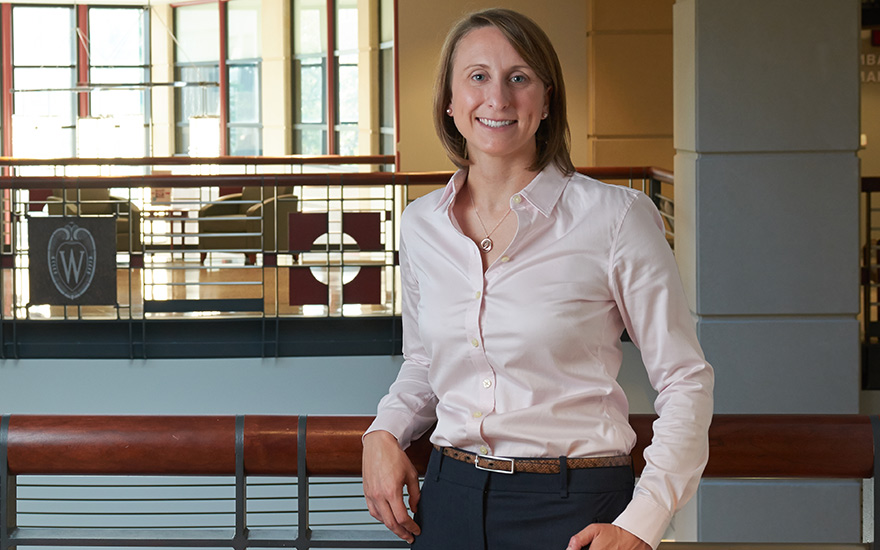
When Emily Griffith sat down to rework her department’s graduate-level advanced audit and assurance services course, she needed to first review the past in order to design for the future.
“Nearly all of the students for the advanced audit class go into auditing for public accounting firms. I did that job 10 years ago, but a lot has changed,” explains Griffith, an assistant professor of accounting and information systems at the Wisconsin School of Business who previously worked as a senior auditing associate at Big Four accounting firm KPMG. “I wanted to make the class really relevant for what they’re going to be doing when they start that first auditing position.”
Griffith was awarded the 2018-2019 Cynthia and Jay Ihlenfeld Professorship for Inspired Learning, and she’s using the award to redesign WSB’s advanced audit course to make it more responsive to student needs and better aligned with the demands of future employers. Griffith says the timing of the Inspired Learning support was ideal, since she, the instructor who taught the course before her, and her department chair all agreed that the course needed an update.
“Our students now are starting their careers on day one, doing what I was doing my second year in,” Griffith says, “so they do face more of a challenge. We want to make sure we are preparing them to hit the ground running.”
Incorporating data analytics, creating agility
Griffith reworked the content of the course by adding data analytics and data analysis practice, including case studies of auditing problems with anonymized real-world data. The final project used case studies based on regulatory reports from the Public Company Accounting Oversight Board (PCAOB); each student team was assigned a different accounting firm, and the teams had to analyze the central problems the PCAOB had identified for each firm.
Griffith also partially flipped the classroom, assigning some individual and team activities for outside of class and creating others that were hands-on within the class periods.
She migrated the course to a module-based format, a series of eight distinct modules that allowed for greater flexibility to make real-time curricular changes and ensure that future course updates are easier to implement.
Our students now are starting their careers on day one… We want to make sure we are preparing them to hit the ground running.
-Assistant Professor Emily Griffith
Woven throughout the course redesign was the advice and recommendations of Griffith’s alumni and industry contacts. Griffith says she received valuable input in particular from alumni who are managers and partners in public accounting firms that hire a lot of WSB students.
“I always like to ask them, what would really make an intern stand out to you? Then I try to use that as a guideline for what skills would be good for our students to have.”
Critical thinking is a common response Griffith hears, as well as agility—being able to shift gears quickly in response to change.
“Employers want people to figure out what to do that hasn’t been done before,” Griffith says. “They are looking for students who have that willingness to teach themselves how to do new things. For example, if students realize that to do a certain task, they need to use Tableau (a data visualization software), can they get there on their own?”
Learning in tandem
Griffith not only redesigned the course, she also taught it for the first time in Spring 2019, learning alongside the students she was teaching.
“Even though I had high expectations for what the students would be able to do, they really exceeded my expectations,” Griffith says. “I think that was a function of my being new because I didn’t know what was going to happen. Many times when they asked me a question about how to do something, I would tell them, ‘I honestly don’t know. Just try your best to figure something out and we’ll see.’”
“I had never really done that before,” Griffith continues, “but it was fun to see what they came up with, because many times they came up with a solution or an approach that I had not thought about.”
Madeline Reesor (BBA ’18, MAcc ’19), an incoming audit assistant at Deloitte, says the course was one of her favorites during her time at WSB and made a big impact. “Not only is Professor Griffith a great lecturer, she designed the course to cover current issues in auditing we can expect to encounter in our careers. From discussing the fraudulent practices at Wells Fargo, to using drone technology to count sheep (inventory), I came out of the course feeling far more prepared to enter the audit field knowing much more about some of the challenges I may face.”
Even though she’s beyond the first launch, Griffith is constantly refining what works and what doesn’t. She’s also designed the course so that future instructors can step in once she’s no longer teaching it.
The Inspired Learning award gave Griffith the time and space to do the creative thinking that innovation requires, and she says it was a chance to look at the “big picture” that’s harder to see when teaching a full course load.
“I’m thankful that the donors had the foresight to make this program possible. In the case of my project, this was something I felt needed to be done—our whole department wanted it to be done—and I don’t think I could have done as good of a job without that critical support.”
Griffith is also thankful for the help of doctoral student Amanda Carlson and Educational Innovations & Learning Design Director Chris Dakes for their assistance in redesigning the course, which was made possible by the Inspired Learning support.
Read about Assistant Professor Emily Griffith’s award from the American Accounting Association.
Tags: